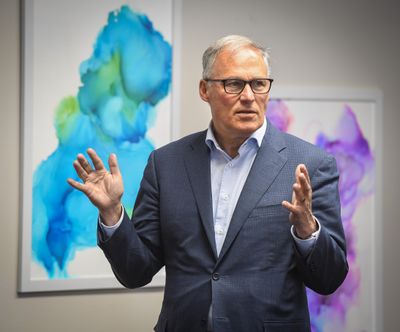Spin Control: Inslee has plenty to win or lose from upcoming debates

With a pair of successive 10-person debates, picking the winner of the first Democratic presidential debate is likely to be difficult unless 19 of those presidential wannabes say something completely stupid or totally incoherent.
But all 20 are likely to to declare victory within minutes of NBC flipping the off-switch on the feed from Miami and going to its panels of “experts.” In truth, any candidate with a campaign worth the money he or she is spending will have a press release written before the debate takes place that only needs someone to press send as soon as the moderator says “Good night.”
With the candidate draw announced Friday, Gov. Jay Inslee may be among those with the most to win – or lose – from this debate-athon.
First, like all the candidates on June 26 – not to mention program executives at NBC, which is devoting two nights of prime time to this exercise – he’s lucky that the lineups weren’t reversed so that his group would debate on June 27. That second night features former Vice President Joe Biden and Sen. Bernie Sanders, running first and second in almost every poll since about Nov. 10, 2016.
That’s the bigger draw. If that were on the first night, all but the most earnest Democrats and truest political junkies could be excused if they watched that debate and skipped the second, figuring they’d seen the premiere match. This way, the first night is similar to the under card in a night of boxing, and there can always be some memorable blows landed in the early fights.
Second, while the Democratic National Committee has steadfastly refused Inslee’s call for a debate focused on climate change, he’ll be on the stage with several other candidates who agree with him on the importance of that issue: Sen. Elizabeth Warren, Rep. Tim Ryan and former Housing and Urban Development Secretary Julian Castro. If the moderators don’t spend at least part of the two hours on climate change, it will reinforce Inslee’s premise the issue is getting short shrift. If the issue comes up, he could get a chance to engage Warren, who is currently the second- or third-strongest candidate in the field, depending on which poll you believe.
If you believe any poll. The DNC does because they made poll results a qualifier for the debates. Sitting at 1% in some polls, and less than that in others, Inslee has to pay them little mind now but make a big deal of any improvement after the debates. To do that, he’ll have to stand out from the crowd. He can toss out some of his well-practiced Trump zingers to get the attention of Democrats who haven’t paid much mind to the race so far. But to really move the polls and stay viable for the fall debates he has to make an impression on issues.
The third reason why Inslee has an outsized opportunity to gain or lose from this first round of debates is the overall competition that night.
Warren is well-known, thanks in part to President Donald Trump giving her a condescending nickname. Sen. Cory Booker can give a rousing speech. Former Rep. Beto O’Rourke started with a bang but has faded lately. Sen. Amy Klobuchar, Reps. Tulsi Gabbard and Tim Ryan and former Rep. John Delaney probably aren’t any better known outside their states (Minnesota, Hawaii, Ohio and Maryland, respectively) than Inslee is outside his. New York Mayor Bill de Blasio has more residents of his city than Inslee has in Washington, but much of the rest of the country has a love-hate relationship with the Big Apple. Castro was a cabinet secretary, but his previous electoral experience was as a mayor and city councilman of San Antonio.
If Inslee doesn’t look like a stronger matchup against Trump than at least half the other candidates on the stage, his campaign could be in serious trouble.
When doing the right thing works out wrong
Steve Bullock of Montana may become the poster boy for the adage that no good deed goes unpunished.
As the Democratic governor who won re-election when his state went for Trump by a big margin, he has as much of a claim to consideration as many who will be on the stage on June 26 and 27.
While it was no secret that he’d been thinking about running, Bullock didn’t get into the race and begin campaigning until the Montana Legislature finished its 2019 session. He said he needed to stay home and work with the Legislature on issues like health care. The late start, coupled with a field that contained nearly two dozen others before he got in, meant he didn’t meet the thresholds of polling results and donor numbers to qualify for a spot in the June debates.
Expect Republicans to compare Inslee, who made his candidacy official in the middle of Washington’s 2019 legislative session and hit the campaign trail frequently while legislators were in Olympia, unfavorably to Bullock. And expect the Inslee campaign to respond by noting he had strong Democratic majorities in both chambers to get things done, while Bullock had substantial GOP majorities in both his.